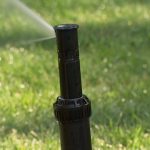5 Moneysaving Commercial Landscaping Chores for Summer
The sun is out, the rain is stopping, and summer is here. Even though plants are blooming and your landscaping is looking its best, there are still summer chores to be done. This to-do list will keep your landscaping bright and healthy through the hot months and into the fall.
Control pests
 Summer is an especially dangerous time for roses, because spidermites and other pests prefer hot, dry weather. If you need to, spray throughout the summer with a combination insecticide/fungicide/miticide. If you need to use chemical sprays, try to apply them in the cooler hours of the day to avoid burns on leaves and foliage. These times are also best for avoiding harm to pollinating bees and other beneficial bugs that are active during the day.
Summer is an especially dangerous time for roses, because spidermites and other pests prefer hot, dry weather. If you need to, spray throughout the summer with a combination insecticide/fungicide/miticide. If you need to use chemical sprays, try to apply them in the cooler hours of the day to avoid burns on leaves and foliage. These times are also best for avoiding harm to pollinating bees and other beneficial bugs that are active during the day.
Prune
Look for dead flowers and deadhead both both annuals and perennials. Removing spent flowers will keep plants from going to seed, which may encourage more blooms throughout the summer. Deadheading is also a good way to fight disease – decomposing flowers are a great attractant for pests!
When it comes to bushes, you can save heavy pruning for later in the year – but do keep an eye on your faster growing bushes and shrubs. You can gently nip off any spreading shoots without harming the plant, which will help shrubs keep their shape through the summer.
Keep An Eye on the Heat
Though our climate is fairly mild, we do sometimes have hot spells. For plants that are used to cooler weather, extreme heat can be a quick killer. Shallow-rooted plants (like some annuals and perennials) will suffer irreversible damage if they get to the wilting stage before being watered.
Try to water when it’s dark, or in the evening or early morning. This will make sure the most water gets to your plants instead of being lost to evaporation. And don’t forget your trees in cases of heat or little rain! They get hot too and are much harder and more costly to replace than smaller plants.
Weed
 Your plants are large and flowering, but that may also mean there are mature weeds lurking in your landscape. If using chemical weed-killers, be very careful not to get it in contact with your plants and flowers. Or, remove weeds by hand so you’re certain you’ve gotten the roots as well as the visible part of the weed. Adding a fresh layer of mulch in the summer can also help curb weeds, as well as help your soil retain even moisture.
Your plants are large and flowering, but that may also mean there are mature weeds lurking in your landscape. If using chemical weed-killers, be very careful not to get it in contact with your plants and flowers. Or, remove weeds by hand so you’re certain you’ve gotten the roots as well as the visible part of the weed. Adding a fresh layer of mulch in the summer can also help curb weeds, as well as help your soil retain even moisture.
Fertilize
Annual flowers and roses will benefit if lightly fertilized once a month during the summer. After application, make sure you water the fertilizer in thoroughly so it gets to the plants roots. If you’re using a liquid fertilizer, be sure to read the instructions and apply during the cool hours so any liquid on foliage doesn’t cause burns.






